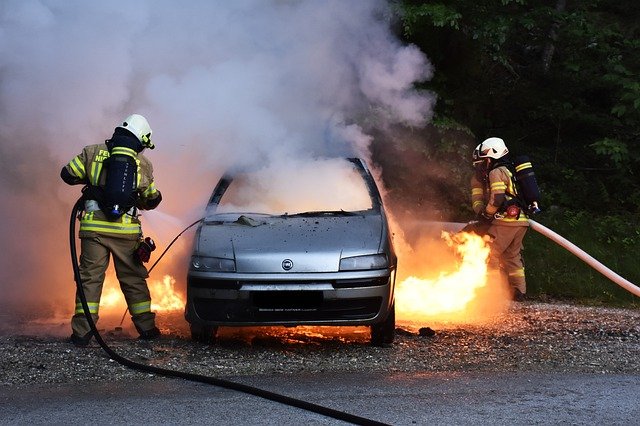Vehicle fires may be more common than you think. Car fires caused almost $2 million in damages in 2018 alone. While vehicles do not spontaneously combust after being involved in an accident, there are a few different means through which a car may ignite after a collision. Additionally, cars can be involved in garage fires or house fires in situations involving attached garages.
Vehicles may burst into flames due to electrical system failure or passenger error, like an unattended lit cigarette. Not only can car fires result in critical skin burns, but they can expose your body to toxic fumes. Vehicle fire and toxic fume exposure can lead to respiratory issues and damage to your lungs, not to mention the extensive damage your vehicle will sustain. Vehicle fire coverage or, more simply put, car caught on fire insurance can save you a lot of financial trouble in the long run.
Can I fire-proof my vehicle?
In most cases, vehicle fires are the result of a damaged vehicle in a car accident. Because the circumstance that creates vehicle fires are often uncontrollable, car fires can be challenging to prevent. There are, however, specific measures a vehicle owner can take to ensure maximum fire safety.
- Remain vigilant regarding leaks or puddles surrounding your vehicle.
- Do not transport gas cans or propane cylinders in the passenger seating area of your car.
- Keep an eye out for cracked or loose wiring and repeated fuse issues.
- Monitor any rapid changes in fuel levels or engine temperature.
The best way to minimize the chances of a car fire is to receive routine maintenance from a professional mechanic. However, often, the situation through which a care fire arises is unforeseeable. These unmitigable circumstances create the need for comprehensive coverage in an auto insurance policy.
What types of insurance cover car fires?
In most cases, comprehensive car insurance policies will cover fire damage to a vehicle. It is essential to keep in mind, however, that comprehensive coverage is optional to vehicle owners. If you are leasing or financing your vehicle, comprehensive car coverage is likely already required. Generally, your car fire coverage is determined by the events that caused it.
For example, vehicle fire may be included in collision coverage if the fire began due to damage from a car accident. If your car is insured against theft and it is stolen and then burned, it will be covered since the damage came about after the vehicle was stolen. The best way to determine if your car is protected from fire damage is by examining your current insurance policy.
What do I do if my car has sustained fire damage?
When your vehicle sustains any damage, it is a good idea to call your insurance company immediately to file a claim. In some cases, a car may be burned or damaged to the point that it is obviously totaled. If your car is not a total loss, you may need to have someone inspect it to assess the damages. Your insurance adjuster may also need to inspect the car to determine the cause of the fire if it is not evident. This inspection will help them rule out possible negligence or fraud.
After a fire, most insurance companies will compensate you enough to restore the car back to its original condition. If it is a total loss, you will be compensated in an equal value to your car’s worth so that you can replace it.
Financial loss due to fire can be devastating. Ensuring that your car is covered in the event of a fire-related loss is always a smart move. This is especially true if you live in an area where forest fires are common. Some insurance providers offer fire-related add-ons for extra coverage. Investing in a comprehensive insurance policy can give you peace of mind when it comes to fire damage and other uncontrollable circumstances, like theft and vandalism.
